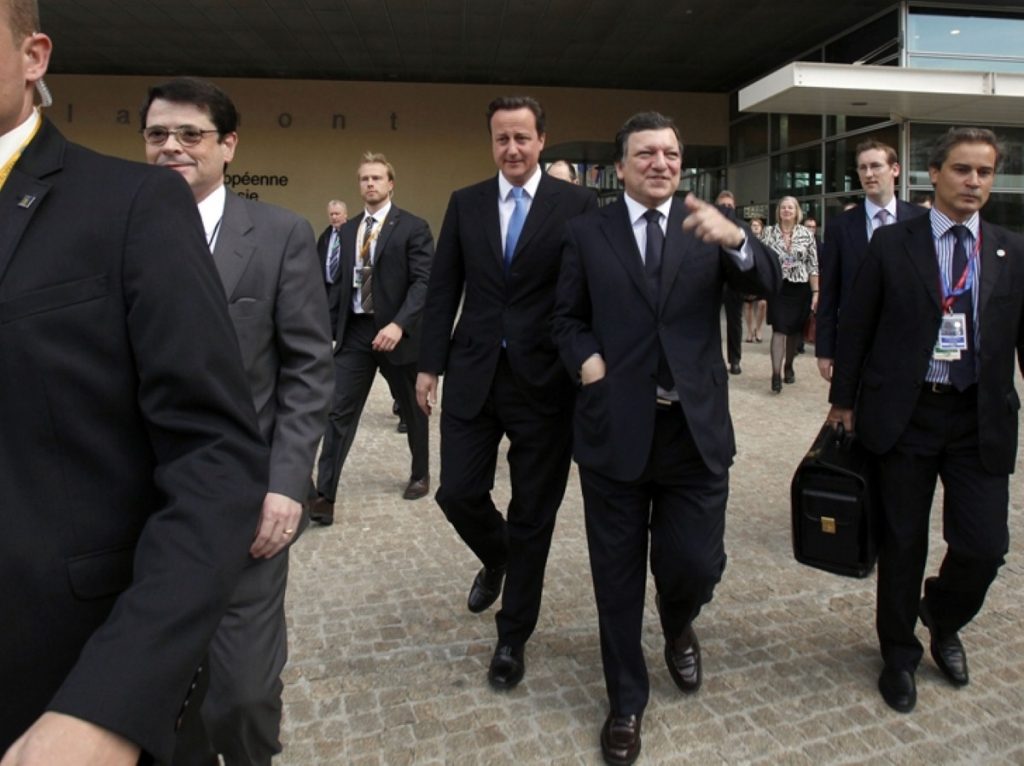Cameron plays the statesman as Spain totters on the brink
By Ian Dunt
David Cameron is attending his first Brussels summit as all eyes turn to Spain, with fears that it could be the next country to require a bailout.
The new prime minister cut a surprisingly warm and amiable tone in Europe, despite widespread fears among European leaders of a Conservative government.
“You’ll see Britain playing a very positive, a very engaged, a very active role in the European Union. And we do have a very strong, positive agenda, an agenda about dealing with deficits as we are doing in our own country,” Mr Cameron said at a press conference this morning.


“We will of course always defend our national interests, as others do, and our national red lines.”
European Commission President Jose Manuel Barroso had warm words for his British guest.
“I want to pay tribute to the efforts [to reduce the deficit] the UK government coalition is taking,” he said, offering Mr Cameron vital ammunition against his Labour opponents at home.
“We believe they are exactly taking the right medicine for the situation.”
Speaking to reporters at the end of a long day of negotiations, Mr Cameron insisted Britain was right to maintain its distance from the European project.
“The decision to stay outside the euro was the right one. It gives you additional flexibility,” Mr Cameron said, presumeably referring to Greece’s inability to devalue its currency when crisis hit.
“There are things we can do at the European level that are important and in Britain’s interests. Trade with Europe, keeping Europe’s markets open, having a say in what the rules are – these things matter.”
European leaders were disarmed when Mr Cameron organised a breakaway grouping of anti-federalist Conservative parties on the continent while in opposition, breaking relations with their traditional centre-right allies.
At the time, current deputy prime minister Nick Clegg branded its members “nutters, homophobes and anti-semites” but the Lib Dem leader has now become a valued part of the coalition government’s foreign team.
Mr Clegg’s European background and ability to speak several languages has made him an important part of the British government’s image. He provides a reassuring pro-European face during negotiations and foreign trips.
But European leaders will be far more concerned about Spain’s fortunes that the arrival of a new British prime minister.
Officials are terrified that the contagion from Greece could now be spreading to Spain, with banks increasingly unconvinced it can make good on its debts.
Spain is a major economy in the EU and, at five times the size of Greece, considered by most officials to be too big to fail.
But a bailout of the country would devastate the eurozone’s ?750 billion emergency fund and raise serious questions about the survival of the European economic project.
A general strike has already been called in the country following severe budget cuts and unpopular labour reforms.
But Spain’s semi-autonomous regional political system makes it harder for central governments to assure banks that regional governments are on board with the cuts programme.
Mr Cameron will nevertheless fight off any attempt to force Britain to present its budgetary plans each spring, arguing those plans should only apply to the 16 countries on the eurozone itself.
But he will be keenly aware that the current crisis plays specifically into eurosceptics’ plans back home. Already the economic crisis has prompted calls for greater political cooperation among eurozone states, predominantly from Angela Merkel.
Backbench Tory MPs are eagerly waiting to test Mr Cameron’s commitment to a referendum if there are any changes in the constitutional arrangements between Britain and the EU.









